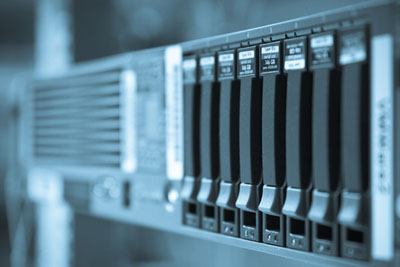Langmeier Backup
A RAID is not a backup! Here we explain why.

Although a RAID mirrors data on different disks, it must not replace data backup.
The abbreviation RAID stands for Redundant Array of Independent Disks, i.e. a redundant arrangement of independent hard disks. In plain language, it means that instead of a single hard disk, several similar disks are operated in a network. Depending on the design of the system, this can increase data security because identical files may be distributed across different hard disks. In addition to the aspect of better protection against data loss, this primarily brings speed advantages when accessing data, which is why RAID is also primarily interesting for fast networks. In this context, people also like to talk about NAS, i.e. network attached storage, which can be accessed by all computers in the connected network. However, not every NAS is automatically a RAID system.
Why multiple hard disks at all?
You can use hard disks in different configurations in a network or even in individual computers. A single drive, for example, cannot be a RAID system at all. The risk of data loss is very high, because if the hard disk should be defective, data is lost without regular backup. Partitioning into different drives is possible, but does not protect against a hardware defect of the single disk. In a JBOD array, there are at least two hard disks that are combined into one large drive. The problem is that if one drive fails, the other drives are also affected and it can be difficult or impossible to read out the data. Therefore, regular data backup is important in all systems.
Different variants make RAID interesting for networks
RAID is available in different arrangements, starting with two hard disks in RAID 0. The parallel storage of data on the different disks means that they can be accessed much more quickly because parallel working is possible. However, this effect can be nullified within a network due to the limits of the network speed. In terms of data security, RAID 0 is not much use, since the data is lost if one disk fails in the entire array. If it is less about the working speed and more about the data security, it becomes interesting from RAID 1. Here, all data is stored twice on the different drives. This means that you always have a duplicate of the files on another disk, but naturally lose half of the effective storage space. Analogously, this also applies to other RAID versions, where additional hard disks in different configurations are used for security. Here, the available storage space can then be used more intelligently.
A RAID can never replace data backup
But regardless of the number of hard disks and the RAID mode used, data loss can still occur. If data is written incorrectly, a virus rages or a software error is present, these problems are also transferred to the copied data and may be unusable despite multiple executions. In addition, accidentally deleted files are not easy to recover. Therefore, despite RAID, regular backups should never be neglected. Only regular data backup can ensure recovery in case of emergency. RAID ensures (especially in the higher configuration levels) rather the unbraked continuation of work in the network, if one (or more) disks should fail. These can then be replaced during operation without necessarily having to stop working on the data. However, it is not recommended to do without a backup because of RAID.
For PC & Laptop
For Server & Virtual Machines
Backup Server Essentials
€349 One time
Select
- One-time permanent license
- 1 year support & updates
- For 1 server installation
- All functions of Langmeier Backup Business
+
- Data backup under Windows Desktop or Essentials Server
- DSGVO-compliant encryption
- Backup protection against ransomware
- Hardware independent recovery
- Compressed backup
- Backup logs via email
- Individual backup scripts
- Backup as Windows service
Recommended
Backup
Server
€499 One time
Select
- One-time permanent license
- 1 year support & updates
- For 1 server installation
- All functions of Langmeier Backup Business
+
- Data backup on Windows Server 2022, 2019, 2016, 2012
- DSGVO-compliant encryption
- Backup protection against ransomware
- Hardware independent recovery
- Compressed backup
- Backup logs via email
- Individual backup scripts
- Backup as Windows service
Backup
V‑Flex
€885 One time
Select
- One-time permanent license
- 1 year support & updates
- Number of virtual machines per host
- All functions of Langmeier Backup Business
+
- Data backup under Windows Hyper-V Server under Windows Server 2022, 2019, 2016, 2012
- Hyper-V data backup during operation
- For host and virtual machines
- DSGVO-compliant encryption
- Backup protection against ransomware
- Hardware independent recovery
- Compressed backup
- Backup logs via email
- Individual backup scripts
- Backup as Windows service
About the Author Sebastian Müller
Partner support
Sebastian Müller is partner and top customer support at Langmeier Software, making him the best person to talk to about Langmeier backup backup solutions.
Phone: +41 44 861 15 70
Email: sebastian@langmeier-software.com
Further lookup: RAID, Backup, Langmeier Backup, Data backup, NAS Backup, Data loss
Articles relevant to the topic
Which backup type is the best choice for my data?This is how important data backup is in real lifeFAT32 or NTFS? Which format is better for backup?
Post a comment here...
This article covers:
RAID Backup Langmeier Backup
Data Backup with RAID System
What is a backup
RAID system backup



 Although a RAID mirrors data on different disks, it must not replace data backup.
Although a RAID mirrors data on different disks, it must not replace data backup.